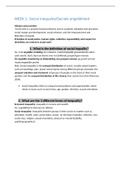WEEK 1: Social inequality/Sociale ongelijkheid
Mission social worker:
‘Social work is a practice-based profession and an academic discipline that promotes
social change and development, social cohesion, and the empowerment and
liberation of people.
Principles of social justice, human rights, collective responsibility and respect for
diversities are central to social work.’
1. What is the definition of social inquality?
NL: Is de ongelijke verdeling van schaarse, maatschappelijk gewaardeerde zaken
zoals macht, bezit, baan en kennis over verschillende groeperingen mensen.
De ongelijke waardering en behandeling van groepen mensen op grond van hun
maatschappelijke positie
ENG: Social inequality is the unequal distribution of scarce, socially valued matters
such as knowledge, jobs, power and property among different groups of people, the
unequal valuation and treatment of (groups of) people on the basis of their social
position and the unequal distribution of life chances that results from this (Weisman,
2004).
Social inequality refers to unequal social positions and opportunities, which
relate to issues such as social class, age, gender, ethnicity, sexual orientation.
2. What are the 3 different forms of inequality?
Economic inequality: inequality in income and wealth;
NL: ongelijkheid in inkomen en rijkdom.
Social inequality: inequality between groups in their access to matters such as
education, health, work, social status, power, on the basis of gender, ethnicity, race,
social class, religion, sexual orientation, physical or mental disability,
spatial/geographical;





